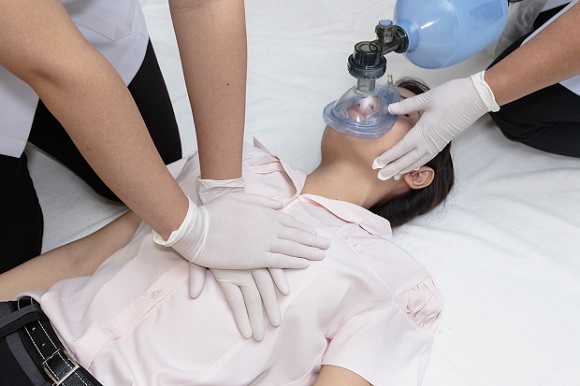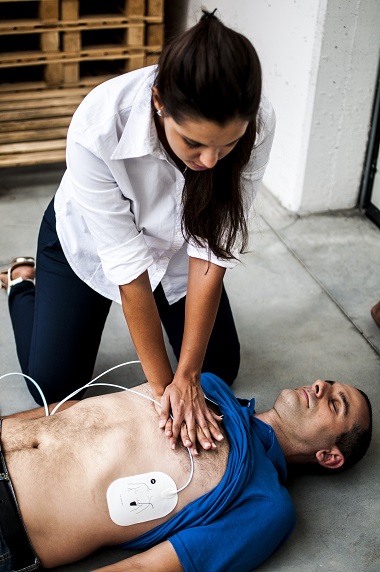 Over the last two hundred years, modern medicine has made fantastic advances in cardiopulmonary resuscitation techniques, but several issues persist that are worth discussing. The most jarring problem with CPR is simply that far too few people know how to administer it and feel comfortable performing CPR in an emergency.
Over the last two hundred years, modern medicine has made fantastic advances in cardiopulmonary resuscitation techniques, but several issues persist that are worth discussing. The most jarring problem with CPR is simply that far too few people know how to administer it and feel comfortable performing CPR in an emergency.
Bad CPR Is Better Than No CPR
Regardless of training, badly administered CPR is still better than nothing. In the case of cardiac arrest, rescue breathing isn’t necessary. Not wanting to perform rescue breathing is one of the primary reasons people give for refusing CPR. Anyone can administer CPR by giving chest compressions to the beat of Staying Alive.
Fear of Further Injuring the Victim
If people simply overcame their fear of giving CPR or further injuring the victim, tens or even hundreds of thousands of additional lives could be saved each year. That said, there are still a number of medical issues that can arise as a result of cardiopulmonary resuscitation, such as gastric distention, vomiting, rib or sternum fractures, and even punctured lungs and liver.
Legal Ramifications of Giving CPR
Is it possible to do more harm than good when giving CPR? Nothing is worse than dying. If a victim is involved in a car accident and requires CPR, even the theoretical risk of neck/spinal injury does not trump the need to remove the victim from the car and give them CPR. All 50 states in the U.S. have Good Samaritan Laws designed to help protect people that offer assistance during an emergency, like when giving CPR.
The problem is that people don’t take action out of fear. If you give CPR and bring someone back to life, breaking a few ribs along the way is better than death.
Ethical Problems with CPR
 Are you required to perform CPR on a cardiac arrest victim? Only if it’s part of your job. What if you’re a medical professional? This may depend on a few factors. What are the ethical ramifications of refusing CPR? Do you have a special relationship with the victim? Is the victim an elderly person that has expressed a desire not to receive CPR? These issues have been debated for years, but every situation is different and there’s no clear answer.
Are you required to perform CPR on a cardiac arrest victim? Only if it’s part of your job. What if you’re a medical professional? This may depend on a few factors. What are the ethical ramifications of refusing CPR? Do you have a special relationship with the victim? Is the victim an elderly person that has expressed a desire not to receive CPR? These issues have been debated for years, but every situation is different and there’s no clear answer.
There are 10 states in the U.S. that require strangers to provide “reasonable” aid to those in peril, but as of Sept. 2016, there are no such laws in Virginia or North Carolina. However, people do not have a legal duty to perform CPR unless administering CPR is part of their job. Many argue that CPR not being part of one’s job does not negate ethical duties.
When Is There a Duty to Rescue?
If you’re in one of the ten states that require it, you have a duty to rescue. If you created the hazard that put a person in peril, you have a duty to rescue. So if you accidently hit someone with your car, you have a duty to do everything in your power to rescue that person, aside from putting your own life in immediate danger.
Special relationships also create a duty to rescue, such as in the case of a parent, common carrier, employer, guest, or spouse.
Success of CPR Hinges on Defibrillation
One significant problem with CPR is that its success greatly hinges on the arrival of a defibrillator and a few other factors. If a victim suffers from cardiac arrest, is immediately given CPR, and receives defibrillation within 10 minutes, there’s a 40% chance of survival. While all of this is certainly possible, that leaves us with a lot of “ifs.”
Personal Defibrillation Devices are expensive, usually running around $1,000 to $2,000, but they’re certainly worth the investment if you ever had to use one.
Training Can Help Overcome Fears
Fear of giving CPR is the biggest problem with CPR. Dispelling that fear is easy, but it takes training and real world practice. Encourage your family and friends to sign up for CPR training classes, or contact us if you’d like to learn more about CPR Training in Virginia or North Carolina.
Get CPR Training Today!
